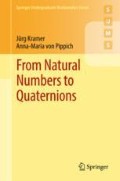Abstract
This chapter starts by establishing the natural numbers with the help of Peano’s axioms. Using the axiom of mathematical induction, addition and multiplication of the natural numbers are introduced. In the second part of the chapter, we develop the concept of divisibility of natural numbers. The main result of this part is the proof of the fundamental theorem of arithmetic. The chapter ends with a section on the division with remainder, by means of which the decimal representation of natural numbers is provided. The appendix to this chapter exhibits a selection of deep results and unsolved conjectures on prime numbers such as the Riemann hypothesis and the twin prime conjecture.
Access this chapter
Tax calculation will be finalised at checkout
Purchases are for personal use only
Preview
Unable to display preview. Download preview PDF.
References
[1] H. M. Edwards: Riemann’s zeta function. Dover, New York, 2001.
[2] J. Hadamard: Sur la distribution des zéros de la fonction ζ(s) et ses conséquences arithmétiques. Bull. Soc. Math. de France 24 (1896), 199–220.
[3] H. A. Helfgott: The ternary Goldbach conjecture is true. Preprint, December 30, 2013. Available online at arXiv:1312.7748.
[4] J. Jones, D. Sato, H.Wada, D.Wiens: Diophantine representation of the set of prime numbers. Amer. Math. Monthly 83 (1976), 449–464.
[5] E. Lindelöf: Le calcul des résidus et ses applications dans la théorie des fonctions. Gauthier-Villars, Paris, 1905.
[6] Y. Matiyasevich: A Diophantine representation of the set of prime numbers. Dokl. Akad. Nauk. SSSR 196 (1971), 770–773. English translation by R. N. Goss in Soviet Math. Dokl. 12 (1971), 249–254.
[7] P. Ribenboim: The little book of bigger primes. Springer, Berlin Heidelberg New York, 2004.
[8] B. Riemann: Ueber die Anzahl der Primzahlen unter einer gegebenen Grösse. Monatsberichte der Königlichen Preußischen Akademie der Wissenschaften zu Berlin aus dem Jahre 1859 (1860), 671–680. In: Gesammelte Werke, Teubner, Leipzig, 1892. English translation by David R. Wilkins available online at www.claymath.org/sites/default/files/ezeta.pdf.
[9] C.-J. de la Vallée Poussin: Recherches analytiques de la théorie des nombres premiers. Ann. Soc. Scient. Bruxelles 20 (1896), 183–256.
[10] I. M. Vinogradov: A new estimate of the function ζ(1+it). Izv. Akad. Nauk. SSSR Ser. Mat. 22 (1958), 161–164.
[11] D. Zagier: The first 50 million prime numbers. Math. Intel. 0 (1977), 221–224.
[12] Y. Zhang: Bounded gaps between primes. Ann. of Math. (2) 179 (2014), 1121–1174.
Author information
Authors and Affiliations
Corresponding author
Rights and permissions
Copyright information
© 2017 Springer International Publishing AG
About this chapter
Cite this chapter
Kramer, J., von Pippich, AM. (2017). The Natural Numbers. In: From Natural Numbers to Quaternions. Springer Undergraduate Mathematics Series. Springer, Cham. https://doi.org/10.1007/978-3-319-69429-0_1
Download citation
DOI: https://doi.org/10.1007/978-3-319-69429-0_1
Published:
Publisher Name: Springer, Cham
Print ISBN: 978-3-319-69427-6
Online ISBN: 978-3-319-69429-0
eBook Packages: Mathematics and StatisticsMathematics and Statistics (R0)

